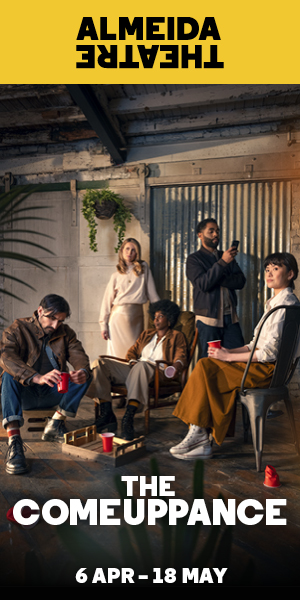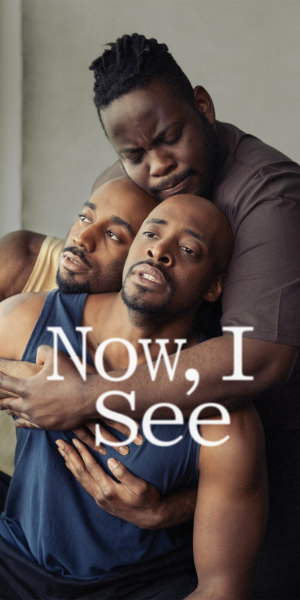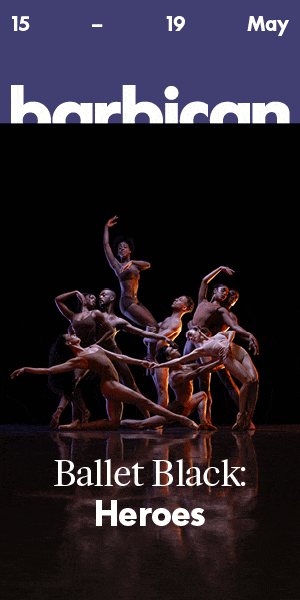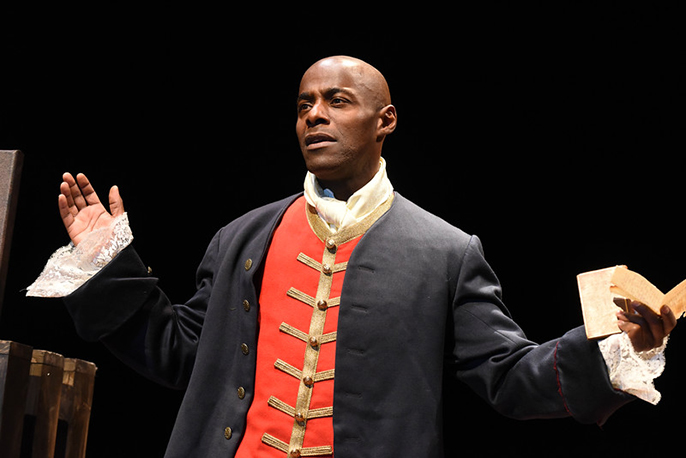
Paterson Joseph – interview
Sancho: An act of Remembrance
Paterson Joseph is a man in demand. In the last year alone, the actor has filmed three complete TV series, playing a police commissioner, a faith healer and an army general. In fact Joseph has not long returned from the US having completed filming for HBO series The Leftovers. Not one to let the dust settle, Joseph is about to embark on another exciting journey. The Green Wing star will be taking to the stage in his one man show, Sancho: an Act of Remembrance. Conceived, written and co-directed by the man himself, Joseph will be portraying Charles Ignatius Sancho who he describes as “One of the most incredible men in history.”
Insert the name of any of my white contemporaries, how come they are able to do Pride and Prejudice or Wuthering Heights and I’m not? In any costume drama, or anything that happened before 1970, there’s few black people to be seen. But, we were there.
Joseph’s vast knowledge of the historical figure is only surpassed by his admiration. He continues in a tone somewhere between a history professor and a t-shirt touting superfan. “He was born on a slave ship. To go from that to dedicating his book Theory of Music to the Princess Royal? He probably would have taught her piano too as he became a part of the royal household. To become the first black person in Britain to vote in 1780 is just astonishing. He was and is one of the most important men for all black people who ever emigrated anywhere.”
The former RSC member has performed in countless theatre productions, winning awards for his roles in Raping the Gold and Les Blancs. But performing his own work is a new endeavour for Joseph, which he puts down to one thing.
“Vanity.” The actor quips as he takes a sip of his Red Bush tea. “Quite literally. Insert the name of any of my white contemporaries, how come they are able to do Pride and Prejudice or Wuthering Heights and I’m not? In any costume drama, or anything that happened before 1970, there’s few black people to be seen. But, we were there. So I wanted to find a character that nobody could refute and go, ‘Well look he was there. He’s interesting, let’s do a show about him.’”
Joseph’s experience of double glazed ceilings seems especially poignant considering the actor’s versatility. Having navigated multiple genres, he has even breached the famously cliquish world of comedy. Today, he is perhaps best known for playing executive egotist Alan Johnson in Peep Show. I admit that in bringing up Channel 4’s longest running sitcom, I was hankering for a Johnson cameo. I delightedly received one, but modesty prevents me from printing it. Joseph then reveals that he has just completed filming for the ninth and final series which he describes as “Very moving. Of course we laughed a lot as usual, but I loved that character. It’s been really rich for confidence to be able to deliver those kinds of lines and make them real contained within this bizarre world.”
The LAMDA graduate has also starred in sci-fi show Hyperdrive and urban fantasy fans will recognise him as the Marquis de Carabas from Neil Gaiman’s Neverwhere. The actor’s CV boasts few race specific roles, which Joseph says was a conscious decision. “Oh definitely deliberate. I didn’t want to be seen as a black actor, first of all I’m an actor, I happen to be black. All my training has been the classical European canon. When I’m performing I want to do everything. Funnily enough though, when I creates stuff it’s probably more on point about where my ethnicity lies”.
This is certainly true of Joseph’s solo show. His St. Lucian heritage is a vital facet in portraying the man termed ‘The extraordinary negro.’ In preparation for the role, The Londoner has delved extensively into Britain’s multiracial history.
Sancho would have started out like a little pet, he was sold to three maiden sisters in Greenwich when he was three. But the more I found out about him, the more I realised he would never have been a quiet, docile little presence. In doing the show I really want people to see him as I see him
“The estimates go between 12, 000 and 20, 000 black people in London during the 18th century. We know they were in the ports, Lichfield of course because Samuel Johnson had his servant Francis Barber. They were in Wales, Cornwall, many mining villages. In the 18th century having a little black child as part of the household was something of a status symbol. You see so many paintings of fine ladies and gentlemen from the era, being fanned or offered fruit by a little, black cherub figure. In fact I’d like to do an exhibition of the black presence in British art, from being objects to being subjects. But in 1732, Sancho would have started out like a little pet, he was sold to three maiden sisters in Greenwich when he was three. But the more I found out about him, the more I realised he would never have been a quiet, docile little presence. In doing the show I really want people to see him as I see him.”
This leads me to ask Joseph exactly how he sees Sancho. At this, the actor scrabbles behind some crates to produce a print of Gainsborough’s famous portrait. “This is how I see him.” Joseph declares triumphantly. He looks upon Sancho’s portrait with genuine fascination and explains that it was coming across the image in a book that began his cross century love affair.
“I just wanted to step behind the canvas and ask, ‘Hey, what are you doing? What are you all about?’ He was a hero. From being a commodity, he became a true man about town. More than anything, I think he wanted to live the life of a free man. A man who was able to gather education and use it and show we are all capable of achieving as much as any privileged European child, if we are given those opportunities.”
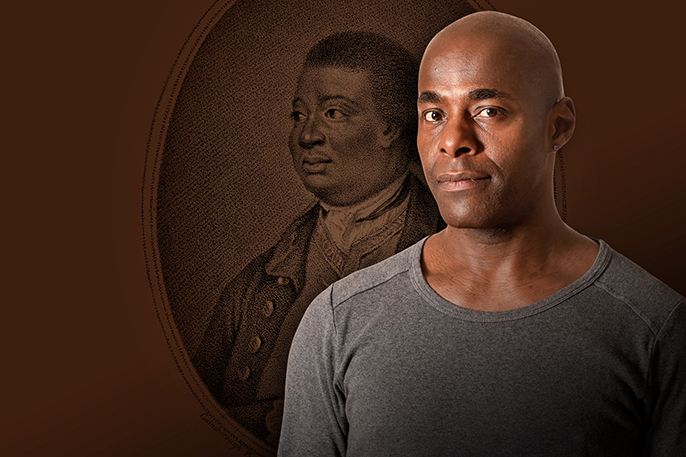
Joseph is quick to compare Sancho’s thirst for knowledge with current attitudes towards education. “This guy had to sneak around. He was taught to read by the Duke of Montagu and it had to be done on the low. It does make me think of some young, black kids today. Amongst some, there is a culture of ‘Reading is for white people. Books are for people who want to be white.’ Literature and theatre just aren’t part of their worlds and that will only change if we make those things more accessible.”
Opportunity is a key issue for Joseph. In 2004 he directed a documentary called My Shakespeare, giving 20 inner-city teens the chance to present a west end production of Romeo and Juliet. This makes me wonder how Joseph himself caught the acting bug.
“When I was about ten I played Bill Sykes in a school production of Oliver. It was the first time anybody had ever said anything nice to me about something I’d done at school. I struggled academically, there are reasons for that. I think my parents speaking Creole to me until I was three then only speaking English to me after that threw me. Also, I was painfully shy. My writing was like hieroglyphics and my maths was useless. But walking home from school with my sister that night I remember thinking ‘Maybe I could do this.’”
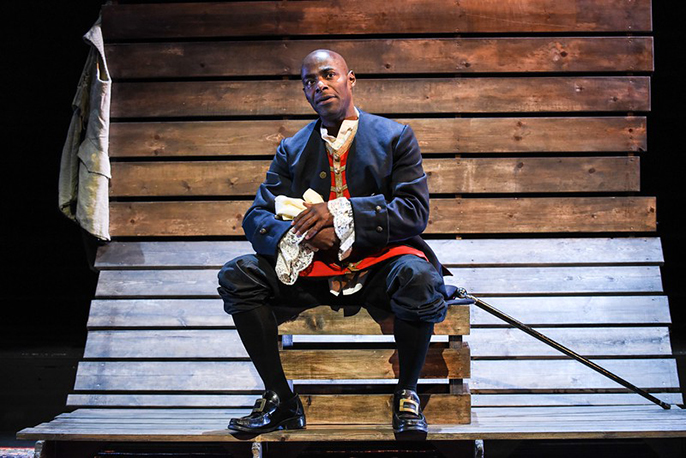
Joseph describes his journey into acting as higgledy-piggledy, which he puts down to his inherent St Lucian-ness. After his initial interest, he put drama aside until he was 14 when he auditioned for the National Youth Theatre. He was turned down due to his crushing shyness and pursued a career as a chef. Eventually, he joined the Cockpit Youth Theatre at 18, and then finally attended LAMDA after picking the school at random out of The Stage magazine.
It is hard to avoid drawing parallels between Joseph and his idol – both members of the Caribbean diaspora; both Londoners and art enthusiasts – similar in their refusal to be stereotyped by their ethnicity and identical in their love of the theatre. Over two centuries apart, Joseph obviously feels a connection with this tenacious pioneer. – a connection and a reverence, which he will share with audiences in his show. With this in mind, I ask Joseph why people should come and see Sancho: An Act of Remembrance.His answer, “Because it’s about him and he’s fascinating. It’s unexpectedly funny and you will be amazed at his life story.”
Info: Sancho: an Act of Remembrance is on UK tour until September 25, 2015 | Visit website for further information

























